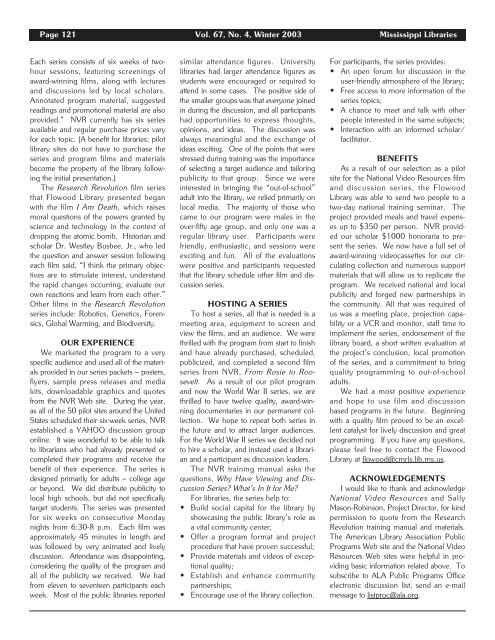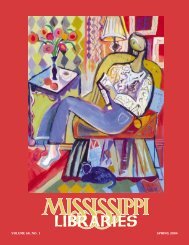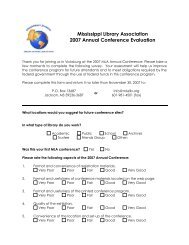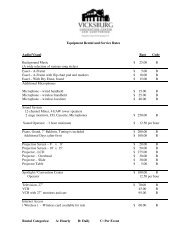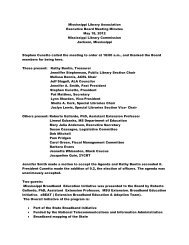Full Text (PDF) - Mississippi Library Association
Full Text (PDF) - Mississippi Library Association
Full Text (PDF) - Mississippi Library Association
You also want an ePaper? Increase the reach of your titles
YUMPU automatically turns print PDFs into web optimized ePapers that Google loves.
Page 121 Vol. 67, No. 4, Winter 2003 <strong>Mississippi</strong> Libraries<br />
Each series consists of six weeks of twohour<br />
sessions, featuring screenings of<br />
award-winning films, along with lectures<br />
and discussions led by local scholars.<br />
Annotated program material, suggested<br />
readings and promotional material are also<br />
provided.” NVR currently has six series<br />
available and regular purchase prices vary<br />
for each topic. (A benefit for libraries: pilot<br />
library sites do not have to purchase the<br />
series and program films and materials<br />
become the property of the library following<br />
the initial presentation.)<br />
The Research Revolution film series<br />
that Flowood <strong>Library</strong> presented began<br />
with the film I Am Death, which raises<br />
moral questions of the powers granted by<br />
science and technology in the context of<br />
dropping the atomic bomb. Historian and<br />
scholar Dr. Westley Busbee, Jr., who led<br />
the question and answer session following<br />
each film said, “I think the primary objectives<br />
are to stimulate interest, understand<br />
the rapid changes occurring, evaluate our<br />
own reactions and learn from each other.”<br />
Other films in the Research Revolution<br />
series include: Robotics, Genetics, Forensics,<br />
Global Warming, and Biodiversity.<br />
OUR EXPERIENCE<br />
We marketed the program to a very<br />
specific audience and used all of the materials<br />
provided in our series packets – posters,<br />
flyers, sample press releases and media<br />
kits, downloadable graphics and quotes<br />
from the NVR Web site. During the year,<br />
as all of the 50 pilot sites around the United<br />
States scheduled their six-week series, NVR<br />
established a YAHOO discussion group<br />
online. It was wonderful to be able to talk<br />
to librarians who had already presented or<br />
completed their programs and receive the<br />
benefit of their experience. The series is<br />
designed primarily for adults – college age<br />
or beyond. We did distribute publicity to<br />
local high schools, but did not specifically<br />
target students. The series was presented<br />
for six weeks on consecutive Monday<br />
nights from 6:30-8 p.m. Each film was<br />
approximately 45 minutes in length and<br />
was followed by very animated and lively<br />
discussion. Attendance was disappointing,<br />
considering the quality of the program and<br />
all of the publicity we received. We had<br />
from eleven to seventeen participants each<br />
week. Most of the public libraries reported<br />
similar attendance figures. University<br />
libraries had larger attendance figures as<br />
students were encouraged or required to<br />
attend in some cases. The positive side of<br />
the smaller groups was that everyone joined<br />
in during the discussion, and all participants<br />
had opportunities to express thoughts,<br />
opinions, and ideas. The discussion was<br />
always meaningful and the exchange of<br />
ideas exciting. One of the points that were<br />
stressed during training was the importance<br />
of selecting a target audience and tailoring<br />
publicity to that group. Since we were<br />
interested in bringing the “out-of-school”<br />
adult into the library, we relied primarily on<br />
local media. The majority of those who<br />
came to our program were males in the<br />
over-fifty age group, and only one was a<br />
regular library user. Participants were<br />
friendly, enthusiastic, and sessions were<br />
exciting and fun. All of the evaluations<br />
were positive and participants requested<br />
that the library schedule other film and discussion<br />
series.<br />
HOSTING A SERIES<br />
To host a series, all that is needed is a<br />
meeting area, equipment to screen and<br />
view the films, and an audience. We were<br />
thrilled with the program from start to finish<br />
and have already purchased, scheduled,<br />
publicized, and completed a second film<br />
series from NVR, From Rosie to Roosevelt.<br />
As a result of our pilot program<br />
and now the World War II series, we are<br />
thrilled to have twelve quality, award-winning<br />
documentaries in our permanent collection.<br />
We hope to repeat both series in<br />
the future and to attract larger audiences.<br />
For the World War II series we decided not<br />
to hire a scholar, and instead used a librarian<br />
and a participant as discussion leaders.<br />
The NVR training manual asks the<br />
questions, Why Have Viewing and Discussion<br />
Series What’s In It for Me<br />
For libraries, the series help to:<br />
• Build social capital for the library by<br />
showcasing the public library’s role as<br />
a vital community center;<br />
• Offer a program format and project<br />
procedure that have proven successful;<br />
• Provide materials and videos of exceptional<br />
quality;<br />
• Establish and enhance community<br />
partnerships;<br />
• Encourage use of the library collection.<br />
For participants, the series provides:<br />
• An open forum for discussion in the<br />
user-friendly atmosphere of the library;<br />
• Free access to more information of the<br />
series topics;<br />
• A chance to meet and talk with other<br />
people interested in the same subjects;<br />
• Interaction with an informed scholar/<br />
facilitator.<br />
BENEFITS<br />
As a result of our selection as a pilot<br />
site for the National Video Resources film<br />
and discussion series, the Flowood<br />
<strong>Library</strong> was able to send two people to a<br />
two-day national training seminar. The<br />
project provided meals and travel expenses<br />
up to $350 per person. NVR provided<br />
our scholar $1000 honoraria to present<br />
the series. We now have a full set of<br />
award-winning videocassettes for our circulating<br />
collection and numerous support<br />
materials that will allow us to replicate the<br />
program. We received national and local<br />
publicity and forged new partnerships in<br />
the community. All that was required of<br />
us was a meeting place, projection capability<br />
or a VCR and monitor, staff time to<br />
implement the series, endorsement of the<br />
library board, a short written evaluation at<br />
the project’s conclusion, local promotion<br />
of the series, and a commitment to bring<br />
quality programming to out-of-school<br />
adults.<br />
We had a most positive experience<br />
and hope to use film and discussion<br />
based programs in the future. Beginning<br />
with a quality film proved to be an excellent<br />
catalyst for lively discussion and great<br />
programming. If you have any questions,<br />
please feel free to contact the Flowood<br />
<strong>Library</strong> at flowood@cmrls.lib.ms.us.<br />
ACKNOWLEDGEMENTS<br />
I would like to thank and acknowledge<br />
National Video Resources and Sally<br />
Mason-Robinson, Project Director, for kind<br />
permission to quote from the Research<br />
Revolution training manual and materials.<br />
The American <strong>Library</strong> <strong>Association</strong> Public<br />
Programs Web site and the National Video<br />
Resources Web sites were helpful in providing<br />
basic information related above. To<br />
subscribe to ALA Public Programs Office<br />
electronic discussion list, send an e-mail<br />
message to listproc@ala.org.


